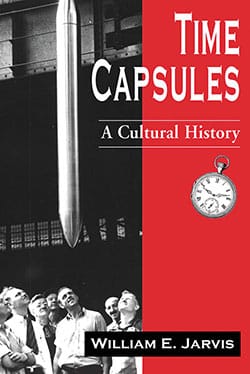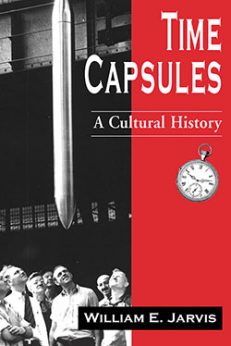Time Capsules
A Cultural History
$49.95
In stock
About the Book
Time capsules have been used for thousands of years to store for posterity a selection of objects thought to be representative of life at a particular time. Such vessels have the dual purpose of causing participants to ponder their own cultural era and think about those to come.
This work is a cultural history of five thousand years of time capsules and other related time-information transfer experiences. It examines both the formal and the popular culture aspects of the time capsule, from its roots in ancient Mesopotamian and Egyptian building foundation deposits to the present utilization of spacecraft probes and other extreme locations. The deposits of 3000 BCE deliberately had no definite date and time to be opened; in 1876 CE came the idea of target-dated deposits. Also discussed are how “real” time capsules work, notional and archaeological time capsules, the height of the time capsule’s popularity from 1935 to 1982, the preservation of writings in time capsules, keeping time in a perpetual futurescape, and turn of the century hype surrounding millennium time capsules.
About the Author(s)
Bibliographic Details
William E. Jarvis
Format: softcover (6 x 9)
Pages: 329
Bibliographic Info: 60 photos, tables, chronology, bibliography, index
Copyright Date: 2003
pISBN: 978-0-7864-1261-7
eISBN: 978-0-7864-8095-1
Imprint: McFarland
Table of Contents
Introduction: The Time Capsule Experience 1
Time Capsule Milestones in World Chronology 5
1 How Time Capsules Work 9
2 Notional and Archaeological Time Capsules 50
3 The Time Capsule’s Ancient Origins and Modern Transformations 82
4 The Golden Age of the Grand Time Capsules 138
5 Writing Down the Ages 175
6 Keeping Time in a Perpetual Futurescape 220
7 Epilogue: Our Ideal Time Capsule 255
Bibliography 265
Index 313
Book Reviews & Awards
“an expansive view…covers thousands of years…diverse…many illustrations…interesting…recommended”—Choice; “recommended”—Public Library Quarterly; “thought-provoking and valuable”—History News; “exhaustive and scholarly study…historical…illuminating…fascinating”—Historic Environment; “a remarkable compilation of anecdotes and historical traces on its topic, along with an enthusiastic and often breathless running analysis. The book is a good read and extraordinarily useful for cultural studies courses”—Journal of Popular Culture; “the first extensive scholarly treatment…through diligent effort…Jarvis has apparently located nearly everything germane to the cultural history of time capsules…wonderfully detailed…Jarvis’s treatise is the best place to get an overall sense of the time capsule experience”—Libraries & Culture; “definitive”—Seattle Weekly; “Brilliant…it’s been a long time since I enjoyed a scholarly work so much.”—Dr. Bill Katz, Professor (Emeritus) Albany–SUNY, School of Public Service, Rockefeller College of Public Affairs & Policy. “An informative (and highly readable) history of a fascinating and enduring aspect of human behavior.”—Richard Gid Powers, professor of history, The Graduate Center, City University of New York. “An extraordinarily enterprising piece of scholarship…represents a pioneer endeavor…should…be read by academics and a wider public…should also stimulate wider interest in its subject.”—Dr. Brian Durrans, Department of Ethnography, The British Museum, London; “Provides a serious analysis of the history, function, and image of time capsules…certainly the definitive reference on the topic.”—Richard J. Cox, professor, archival studies, School of Information Sciences, University of Pittsburgh. “Will surely stand as a landmark in cultural history and studies for years to come…an exceptional piece of research; indeed, it is a model of how one should go about documenting cultural history.”—Dr. Robert Ascher, professor emeritus, anthropology, theatre, film and dance, Cornell University, Ithaca, New York.






